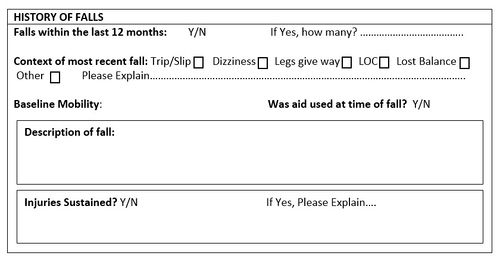The smart Trick of Dementia Fall Risk That Nobody is Talking About
The smart Trick of Dementia Fall Risk That Nobody is Talking About
Blog Article
Not known Details About Dementia Fall Risk
Table of ContentsDementia Fall Risk Things To Know Before You BuyGetting My Dementia Fall Risk To WorkThe Best Guide To Dementia Fall RiskSome Known Factual Statements About Dementia Fall Risk The Basic Principles Of Dementia Fall Risk
Analyzing loss risk assists the entire health care team develop a more secure setting for each and every client. Make certain that there is an assigned area in your clinical charting system where team can document/reference ratings and document appropriate notes associated with drop prevention. The Johns Hopkins Loss Threat Analysis Tool is just one of numerous tools your personnel can utilize to aid avoid adverse clinical occasions.Person falls in health centers are typical and debilitating adverse events that persist despite years of effort to minimize them. Improving interaction across the assessing registered nurse, treatment team, individual, and client's most entailed close friends and household might enhance loss prevention efforts. A team at Brigham and Women's Hospital in Boston, Massachusetts, looked for to create a standardized fall avoidance program that focused around improved communication and person and family involvement.

The innovation team highlighted that effective execution depends upon patient and team buy-in, combination of the program into existing workflows, and fidelity to program procedures. The team kept in mind that they are coming to grips with exactly how to make sure connection in program execution during periods of situation. During the COVID-19 pandemic, as an example, an increase in inpatient drops was connected with limitations in patient interaction along with constraints on visitation.
Some Known Details About Dementia Fall Risk
These cases are generally thought about preventable. To apply the treatment, organizations require the following: Accessibility to Autumn TIPS sources Loss pointers training and retraining for nursing and non-nursing personnel, consisting of brand-new nurses Nursing process that permit client and family engagement to conduct the drops analysis, make certain usage of the avoidance plan, and conduct patient-level audits.
The outcomes can be extremely detrimental, commonly accelerating client decline and causing longer medical facility stays. One research approximated remains increased an added 12 in-patient days after a person autumn. The Fall TIPS Program is based on appealing individuals and their family/loved ones throughout three primary processes: analysis, personalized preventative interventions, and bookkeeping to make sure that clients are engaged in the three-step fall avoidance process.
The patient assessment is based upon the Morse Loss Range, which is a verified fall risk assessment tool for in-patient healthcare facility settings. The scale includes the 6 most usual reasons clients in hospitals fall: the client autumn history, risky problems (consisting of polypharmacy), use of IVs and other exterior tools, mental standing, gait, and movement.
Each danger aspect relate to several actionable evidence-based interventions. The nurse creates a strategy that includes the treatments and shows up to the treatment group, person, and family site link on a laminated poster or printed aesthetic help. Registered nurses develop the plan while meeting the patient and the person's family members.
Rumored Buzz on Dementia Fall Risk
The poster works as a communication device with various other members of the patient's care group. Dementia Fall Risk. The audit element of the program includes analyzing the person's understanding of their threat variables and prevention strategy at the unit and medical facility levels. Registered nurse champs conduct a minimum of five specific meetings a month with people and their households to look for understanding of the loss avoidance strategy

A projected 30% of these falls outcome in injuries, which can range in extent. Unlike other adverse occasions that require a standard medical response, loss avoidance look these up depends very on the demands of the individual.
Dementia Fall Risk Fundamentals Explained

Based on bookkeeping outcomes, one website had 86% conformity and 2 websites had over 95% compliance. A cost-benefit analysis of the Loss ideas program in eight hospitals approximated that the program expense $0.88 per person to execute and led to financial savings of $8,500 per 1000 patient-days in straight prices connected to the avoidance of 567 falls over three years and eight months.
According to the development team, companies curious about carrying out the program must perform a readiness evaluation and falls avoidance spaces evaluation. 8 In addition, organizations must guarantee the necessary infrastructure and workflows for implementation and develop an application strategy. If one exists, the company's Autumn Avoidance Task Force should be associated with preparation.
Excitement About Dementia Fall Risk
To start, companies must guarantee completion of training modules by nurses and nursing assistants - Dementia Fall Risk. Hospital staff must examine, based upon the demands of a healthcare facility, whether to utilize an electronic health document hard copy or paper version of the autumn avoidance plan. Implementing groups must hire and train registered nurse champs and develop processes for bookkeeping and reporting on Continue autumn data
Staff need to be involved in the process of upgrading the workflow to engage clients and family members in the analysis and prevention plan process. Solution ought to be in location so that systems can understand why a loss happened and remediate the reason. Much more particularly, nurses must have channels to supply ongoing feedback to both personnel and device management so they can adjust and boost autumn prevention process and interact systemic troubles.
Report this page